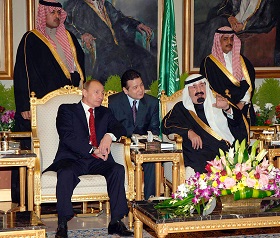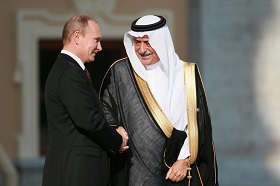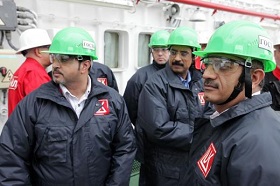Russia and Saudi Arabia: Untapped Reserves of Business Cooperation
Stroytransgaz pipeline in Arabia Saudi
(no votes) |
(0 votes) |
Badly in need of a partnership with Saudi Arabia, a key state in the Arab and Muslim world, Russia stands to gain from diversified cooperation in areas ranging from hydrocarbons to the Middle East and global security. The two states’ current relationship can hardly be called one of trusted partners, although this can be improved – including through the expansion of bilateral business ties.
Badly in need of a partnership with Saudi Arabia, a key state in the Arab and Muslim world, Russia stands to gain from diversified cooperation in areas ranging from hydrocarbons to the Middle East and global security. The two states’ current relationship can hardly be called one of trusted partners, although this can be improved – including through the expansion of bilateral business ties.
The two countries established diplomatic relations back in 1926, when the Soviet Union pioneered the recognition of the independent Saudi state, i.e. the unified Kingdom of Hejaz, Nejd and affiliated territories that was later to be renamed the Kingdom of Saudi Arabia (KSA) in 1932. However, in 1938 the Soviet diplomatic mission in Jeddah was closed and diplomatic ties between them virtually broken off as a result of the worsening internal situation and external relations of the USSR, and the Peoples' Commissariat for Foreign Affairs drastically cut its staff abroad. European security issues soon became paramount, while the Saudis geared their foreign policy toward the West. During the Cold War, the Soviet Union and the KSA, under profound U.S. influence since the 1930s, found themselves locked in confrontation.
Although diplomatic relations were restored in 1990-1991, subsequent attempts by Russian high-ranking envoys to promptly engage the affluent monarchy ended in failure.
In the early 2000s, their bilateral relationship, including its economic element, received an impetus from the top-level private talks that took place during the official visits of Crown Prince (currently the King) Abdullah bin Abdul Aziz to Russia in September 2003 and President Putin's visit to Saudi Arabia in February 2007.
During the decade since Prince Abdullah's visit to Russia, bilateral trade between the two states has been growing.
Prospects for the Expansion of Russian-Saudi Trade
During the decade since Prince Abdullah's visit to Russia, bilateral trade between the two states has been growing. It stood at USD 235 million in 2005, at about USD 450 million in 2008, and had risen to one billion dollars in 2012 [1], with Saudi exports in 2012 amounting to USD 395 million and imports to USD 136.8 million. Russia's share in Saudi’s total turnover, meanwhile, stands at a meager 0.2 percent. As Russia’s Ambassador to Saudi Arabia Oleg Ozerov noted, these bilateral trade figures are "too low" [1].

Vladislav Senkovich:
What is Holding Back the Consolidation of
Russian Business Positions in the Gulf States?
The Kingdom's main trading and economic partners include the United States (14.3 percent), China (13.7 percent), Japan (13.7 percent), South Korea (9.9 percent), India (8.2 percent), and Singapore (4.3 percent) in export; and China (13.5 percent), the United States (13.2 percent), South Korea (6.7 percent), Germany (6.5 percent), India (6.3 percent), and Japan (6.0 percent) in import.
The comparatively low Russia-KSA trade figures can be explained by similarities between the two economies. Trade remains unbalanced, with Russian exports of goods including barley, reinforced steel, bar copper, copper rods, pipes, drilling equipment and semi-processed metal items accounting for almost 99 percent, while Saudi Arabia exports mainly petrochemicals [1].
At the same time, Saudi Arabia needs machines, vehicles, food, chemicals, etc., all of which could be supplied by Russia. The Saudis may also need Russian mobile well completion and workover rigs, railway traction assemblies, tank cars made by Uralvagonzavod Corporation, cargo planes, and desalination plants.
Mutual Investment
Regrettably, bilateral investment is virtually at a standstill, with the LUKOIL project being the only exception. In 2004, the Russian company signed a 40-year exploration and development contract for Block A with Saudi Aramco establishing JV LUKSAR, with total investment in exploration and appraisal operations exceeding USD 500 million.
Economic projects involving Saudi money are scarce because the KSA regards long-term investment in Russia's real economy counterproductive due to the adverse investment climate, the absence of agreements on the mutual protection of investments and an accessible and fully informative catalogue of emerging investment projects.
Open sources offer no precise data on the nature of Saudi investment in the Russian economy, although it has been alleged that Saudi capital predominantly goes to the banking sector and Islamic cultural centers.
At the same time, there have been notable examples of Saudi participation in other Russian projects. In 1991, Petrosakh, the first Russian-Saudi joint venture was established to develop the Sakhalin oil fields, with Nimr Sakhalin, a subsidiary of Saudi Nimr Petroleum, acting as a founder. In 2004, Petrosakh was sold to Urals Energy. Kingdom Hotels International, a Saudi firm managing five-star hotels in Moscow and Sochi through the Swissôtel Hotels & Resorts chain is also, clearly, worth a mention.
Economic projects involving Saudi money are scarce because the KSA regards long-term investment in Russia's real economy counterproductive due to the adverse investment climate, the absence of agreements on the mutual protection of investments and an accessible and fully informative catalogue of emerging investment projects. While a radically change in the investment climate is sure to take a long time, individual steps to rectify the situation could be made right now.
Russian Businesses in Saudi Arabia
Certain Russian companies have had operations in Saudi Arabia, including LUKOIL, Stroytransgaz, KAMAZ, Russian Railways, Volzhsky Diesel, Kaspersky Laboratory, Zakneftegazstroy-Prometheus, Promstroygroup, Energostroy, Initial Stage Management, and Globalstroy-Engineering[2].

Russian President Vladimir Putin and Ibrahim
bin Abdulaziz Al-Assaf, Minister of Finance of
Saudi Arabia
Russian companies flocked to the KSA after the 2008 crisis, enthused by idling heaps of hard currency and their own desire to turn a profit fast.
In 2009-2011, more than 15 Russian firms that tried to launch operations in Saudi Arabia encountered setbacks. Russian Railways won a tender for the construction of a section of railway, but the results were later rescinded [3]. Globalstroy-Engineering opened a branch in the Kingdom, but closed it in April 2009 after four years of failed bids [3].
The key reasons for Russia’s failures include general recklessness about operating in Saudi Arabia, the absence of clear-cut business strategies, a lack of attention paid to the particular nature of the local market, and their unpreparedness for the time-consuming and costly pre-qualification and qualification procedures that are obligatory in order for any company to submit bids [2].
However, some Russian ventures have triumphed. For example, Stroytransgaz has completed construction work on the 217-km-long Sheiba-Abquiq oil pipeline and the Shuqaiq water supply system, supplied equipment and completed the Hawiyah-Uthmaniyah-Shedgum gas fields. But cases like this are few and far between, since Russian firms have yet to win the reputation of reliable partners who are fit for long-term commercial relationships.
Bilateral cooperation does, however, seem promising via contacts between major and medium-size businesses, primarily those based in parts of Russia that have a substantial Muslim population.
Opportunities for Russian Business

The representativs of Saudi Arabia oil company
"Saudi Aramco" at "Lukoil-KMN"
Saudi Arabia has long been an attractive location for national and foreign investors due to ample opportunities beyond the hydrocarbon sector. The government is keen to create the conditions needed to diversify the economy, through advancing local industries, construction, trade, telecommunications, infrastructure and services, all areas in which Russian firms could fight for contracts.
According to Saudi Finance Minister Ibrahim Abdulaziz Al-Assaf, the 2013 budget allocates funds for national investment programs that aim to maintain long-term economic growth and create jobs.
By 2020, the population of Saudi Arabia is expected to grow from today's 28 million to 37 million. Hence, priorities include education, which is set to get USD 54.4 billion, social services (USD 26.7 billion), national security, transport infrastructure (USD 17.3 billion), municipal services (USD 9.6 billion), waterworks, farming, industry and other sectors (USD 15.2 billion) [4]. These programs are highly ambitious, as can be seen from the plans in education, which envisage completing construction work on 1,900 schools in 2013 and launching 539 more similar projects [4].
Saudi Arabia has long been an attractive location for national and foreign investors due to ample opportunities beyond the hydrocarbon sector.
Cooperation seems promising in the development of Saudi Arabia’s transportation infrastructure. Riyadh has prioritized the national railways, planning eventually to connect all parts of the country, and the Railway Development Plan allocates about SR 365 billion (USD 98.6 billion) to this end by 2040 [5]. However, the country is short of local companies that are suited to carrying out this work, hence the Saudis plan to invite more foreign contractors, and Russian firms such as Russian Railways International, Zagranstroy, Zarubezhstroy and others could take part in the related tender procedures.
Some firms are involved in helping the Saudis develop the automobile sector. Isuzu Motors has already launched a truck factory [6]. Tata Motors is going to build a plant to manufacture Jaguars and land Rovers [7]. The U.S.-Saudi Business Council is considering setting up General Motors, Chrysler and Ford plants in the KSA[8]. Russian products may also find themselves in demand, for example localized series and advanced automotive equipment made by the Military Industrial Company or KAMAZ.
There also seem to be open avenues for cooperation in nuclear energy, aerospace, military-technical sector and agriculture.
The Saudi market seems open to Russian business, as can be seen from the following:
- In October 2008 and June 2010, Saudi firms attended the Arabia-EXPO international exhibition in Moscow.
- On June 17-19, 2010, a Saudi delegation headed by Governor of the General Investment Authority Amr Al-Dabbagh met with Russian officials and businessmen at the St. Petersburg International Economic Forum.
- In June 2011, a delegation from the Saudi Advisory Board headed by Chairman of the Committee on Economy and Energy Saad Al-Shuwaib visited Moscow to set up talks between prominent Saudi entrepreneurs and representatives of Russia's Foreign Ministry, Energy Ministry, Chamber of Commerce and Industry, and major companies.
How to Exploit this Potential?
A cooling in bilateral political relations, chiefly due to differences on Syria, has had a profound impact on economic activities. According to Saudi expert Abdullah bin Abdulmuhsin al-Faraj, "Russia is still to grow into a strong country reliable in dire straits. Hence, bilateral trade remains insignificant."
In June 2012, in protest against Russia's stance on Syria, Riyadh officially rejected a delegation of Russian companies who had come to the KSA for a variety of business events and talks with potential partners. Nevertheless, working meetings between Russian and Saudi entrepreneurs during the delegation's time in the country have only confirmed the existence of this reciprocal interest.
Since that episode, Saudi Arabia’s derogatory rhetoric toward Russia has been on the decline. The recent meeting between President Putin and the KSA intelligence chief Bandar bin Sultan suggests that Riyadh has to respond to Russia's actions (over Syria, the Iranian nuclear program, etc.) and is unlikely to seek to deepen the confrontation. Common sense and practical thinking suggest the need for normalized bilateral relations, and the two countries’ business communities could accelerate the process.
Trade and economic relations seem to offer the appropriate tool for easing bilateral tensions, necessitating the speedy revival of the intergovernmental Russian-Saudi Commission on Trade, Economic, Scientific and Technology Cooperation, which is intended to improve the business climate and legal grounds for economic interaction, and the appointment of its Russian co-chairman.
In 2002, the Russian-Saudi Business Council was set up within the Russian-Arab Business Council, with the Russian side headed by Vladimir Evtushenkov, President of Sistema, and the Saudi side – by Usamah Al-Kurdi, ex-chairman of the Saudi Council of Chambers of Commerce. The bilateral council did a great deal to form business delegations for trips to Saudi Arabia, and in March 2011 Jeddah hosted the Week of Russian Business in Saudi Arabia. It was attended by representatives of 70 major Russian firms and deemed a success (1, 2). Regular sessions of the intergovernmental commission could also serve to reinvigorate the Council's operations.
The mechanism of intertwined interests might also bring results. For example, allowing the Saudis to invest in the production of grain for subsequent export to the KSA could be changed to preferences for Russian state-owned and private firms in obtaining Saudi contracts. Strengthened cooperation between Russian financial institutions and regional and national banks, i.e. Islamic Development Bank, Arab Fund for Economic and Social Development, etc would also be of great help for Russian participation in Saudi infrastructural projects.
Economic and trade ties may easily prove stronger than political differences. At that, the focus should be less on building up fluctuating trade volumes, and more on joint investment-based projects, which seems a fireproof path to mutual trust. And it would also be a good idea to prop up future achievements in advancing trade and economic cooperation with personal contact between national leaders.
Broadly speaking, future success in the Russian-Saudi trade and economic dialogue will to hinge on the political will of the leaders involved, government support to exporters, and greater initiative by businesses.
1. Russia Keen to Expand Trade and Investment Ties // Saudi Commerce and Economic Review. 2013. Issue 225, January. P. 42–43.
2. K. Dudarev. How to Do Business in Saudi Arabia: Differences from other Arab Countries. // Asia and Africa Today. 2012. issue 12. Pp. 39–43; 2013. Issue 1. Pp. 25–29.
3. K. Dudarev. Ibid. // Asia and Africa Today. 2013. Issue 1. Pp. 28.
4. Budget 2013: Heavy Spending on Welfare, Infrastructure. P. 18–20.
5. Saudi to Invest SR365 Billion in Railways by 2040. P. 12.
6. Made in Saudi Arabia: First ISUZU Truck on Road. P. 44.
7. Tata Signs Deal to Build Land Rover in Kingdom. P. 14.
8. Ford to Set Up Plant in Saudi Arabia // Saudi Commerce and Economic Review. 2013. Issue 231, July. P. 13.
(no votes) |
(0 votes) |





